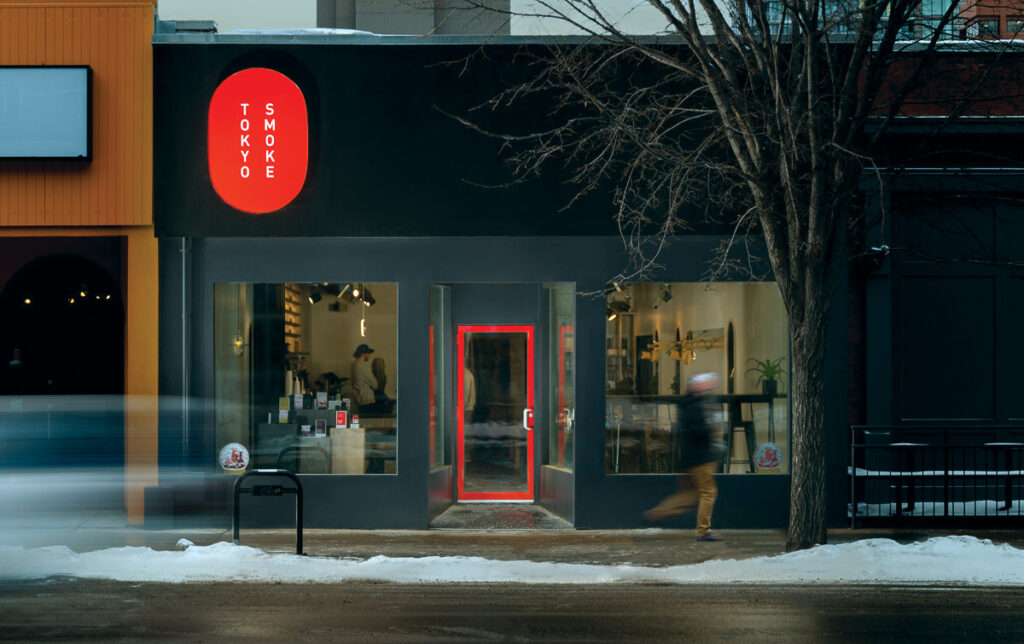Budding New Business

A look at the new operators bringing cannabis to the consumer.
On Nov. 7, last year, the Manitoba Government issued its Request for Proposals for Retail Cannabis Stores. As part of the province’s Indigenous Procurement Initiative, the RFP favoured respondents that included Indigenous business participation. Points were awarded to proponents who offered to involve Canadian Indigenous businesses in the operation of the proposed retail cannabis stores, either directly through the retailers or via subcontract. And to further promote Manitoba First Nations specifically, additional points were awarded if the Canadian Indigenous business was also a certified Manitoba Indigenous Business.
“Manitoba Indigenous Participation and Canadian Indigenous Participation were two separate, individually scored criteria in the November 2017 Request for Proposal,” says a provincial spokesperson. It proved a boon to Manitoba First Nations desirous of participating in the new cannabis industry. Many eagerly linked up with established companies already holding licenses. It was win-win: with those companies enhancing their bids by bringing Indigenous members on board – as well as opening up new opportunities for Aboriginal groups to diversify their business ventures.
It showed on Feb. 16, 2018, when the province announced conditional acceptance of four proposals. All four retailers have Indigenous participation in their organizations, varying from partnership arrangements, organizational management, executive representation, and/or financial investment.
The fortunate four selected in that first round:
Consortium of Delta 9 Cannabis Inc. and Canopy Growth Corporation
Delta 9 operates an 80,000-sq.-ft. production facility in Winnipeg and expects to hire about 100 people for production and retail in the first year and an additional 100 the year after. Founded in 2012, Delta 9 obtained its production license under the federal Marijuana for Medical Purposes Regulations in December 2013, followed by a license to distribute medical cannabis in March 2014. They were the fourth licensed producer of medical cannabis in Canada.
Consortium partner Canopy Growth is headquartered in Smiths Falls, Ontario and operates several production facilities across Canada and around the world with over 700,000 square feet of production licensed under Canada’s medical cannabis framework. In Manitoba, Tweed – a Canopy Growth subsidiary – will operate retail stores, one in Brandon and two in Winnipeg. Tweed products will also be available through Delta 9 Cannabis locations in the province.
Delta 9 has been granted site specific licenses for its first two retail outlets: Thompson, Man., and the St. Vital area of Winnipeg. The Winnipeg location is a 3,200 square foot outlet, and opened its doors to the public on Oct. 17, the first day of cannabis legalization in Canada. The second store in Thompson is also centrally located, at the City Centre Mall in the downtown core, adjacent to anchor tenants like Walmart and Safeway. The company also awaits finalization of two more site specific agreements for outlets in the downtown core of Brandon and in the Osborne Village area of Winnipeg.
Indigenous participation in the consortium is progressive. “Thus far we have partnered with Waywayseecappo First Nation [located near the southwestern corner of Riding Mountain National Park] and plan to open a store with them in Brandon at some point in 2019,” says Gary Symons, Director of Communications at Delta 9 Cannabis Inc. With reference to the province’s second round of RFPs for cannabis retailing, he says, “We are also interested in other partnerships moving forward under the recently announced rural regions RFP for cannabis stores.
National Access Cannabis
Operating medical cannabis care centres across Canada, National Access Cannabis (NAC) is adapting its already established medical clinic model to meet the needs of the new Manitoba retail market and deliver secure, safe and responsible access to legal cannabis – while welcoming participation with several First Nations. “National Access Cannabis has partnered with three Manitoban First Nations groups: Opaskwayak Cree Nation, Long Plain First Nation, and Nisichawayasihk Cree Nation,” says Matt Ryan, VP of Marketing. “These partnerships are expected to establish retail cannabis distribution on First Nation lands under Indigenous and NAC leadership.” Ryan says they will supply legal cannabis, leveraging NAC’s deep knowledge of safety, security and harm reduction through a network of First Nation-owned stores in Manitoba. “The stores will be staffed by First Nations and trained using NAC’s proprietary model to ensure safe and secure distribution of legal cannabis,” he says, adding that stores present both economic opportunities and expanded access for Manitobans. More recently, the company announced two additional partners: Brokenhead Ojibway Nation, and Peguis First Nation.
Located 530 kilometres northwest of Winnipeg, the Opaskwayak Cree Nation’s (OCN) participation includes a secured loan to NAC: $35 million to build up to 70 cannabis retail locations across western Canada. The loan’s timing was to allow NAC to open retail locations in time for the Oct. 17 launch date. NAC plans to eventually open as many as 100 stores. The loan is OCN’s largest but not its first investment in NAC: In September 2017 they invested $3 million for a 10 per cent equity stake. The business partnership is in line with the federal government’s stance that Indigenous communities should be able to participate in the legal cannabis economy, said OCN Chief Christian Sinclair during a December 2017 press conference.
“We saw it as… an economic opportunity which would address our social issues as well,” said Sinclair. “The war on drugs, or in this case cannabis, is over. That allows us to participate, and now initiate a war on poverty by taking the resources that we can develop from this initiative and apply it to strengthen our governments and our societies as First Nations going forward.
“OCN has always believed in and supported the vision of NAC,” said Sinclair in a July 2018 news release. “We invested when NAC went public over a year ago, which was a pivotal moment for NAC and for OCN. This was an aggressive move for a First Nation, making a material investment in a cannabis company. What we saw then is the same as we see now, that we believe there is potentially more margin in retail than in other parts of the industry value chain. We believe that this financing allows NAC to take advantage of another pivotal moment and build a dominant footprint of cannabis retail operations.” Sinclair is a director of NAC.
Chief Dennis Meeches of NAC partner Long Plain First Nation agrees. “Prohibition doesn’t work, and so we support the legalization of marijuana,” he said. “Obviously, it would be foolish for us not to be involved in this industry, because of our location.
“Although the cannabis industry might not be the saviour for First Nations and Indigenous people, it will go a long way to helping provide sustainable development in the years to come,” said Meeches. “Our people need to work, we need to lift our people out of poverty. The struggle for economic independence is real.”
As with many of the participating Manitoba First Nations, Long Plain is participating through its economic development arm, the Arrowhead Development Corporation (ADC), where the chief and council are board members.
Tim Daniels, ADC’s CEO, says the cannabis retailing involvement is all about diversifying Long Plain’s businesses and creating employment. “We’re into gaming, fuel, commercial property rentals, and have kind of peaked in those markets. This will diversify our revenue streams. It’s a new emerging market where we want to be in there from the get-go.” He adds that all revenues from these are plowed back to the community into social programs, education, recreation, culture and so forth.
Long Plain plans to initially open two outlets. “We are partners to operate our own retail stores on our two reserves, Portage La Prairie and Winnipeg,” says Daniels. Long Plain is looking at locations on its Madison Street urban reserve land near Polo Park in Winnipeg, as well as its Keeshkeemaquah urban reserve land in Portage La Prairie. “In Winnipeg we are the only urban reserve and there are some advantages to opening stores on reserve property in large urban centres,” says Daniels.
It’s a calculated approach, as shown by an ADC advertisement for a store manager position at Meta Cannabis Supply Co. (a NAC brand) that states, “This has never been done before. We are creating culture based on our values and we want to hire people who feel a sense of ownership and responsibility to demonstrate that cannabis can enhance the lives of Canadians and their communities.”
NAC’s partner Nisichawayasihk Cree Nation (NCN), about 80 kilometres west of Thompson, also invests through its company, Nelson House Development Corporation, for economic development. It was created by the NCN Chief and Council in 1992 to help in fulfilling its vision of sovereignty, self-sufficiency and self-governance. Similarly, activities of the corporation like cannabis retailing are aimed at building capacity, creating employment, and generating revenue to fund NCN programs and services.
Tokyo Smoke in partnership with BOBHQ
As part of Hiku Brands Company’s goal to establish a retail cannabis presence across Canada, Tokyo Smoke – a wholly owned subsidiary of Hiku – say they plan to build a network of design-forward retail cannabis stores in Manitoba with a focus on customer experience, product selection, and consumer education.
BOBHQ is a leading North American distributor of smoke shop and counterculture products. With retail locations in Manitoba and distribution facilities in Canada and across the U.S., the company distributes thousands of different products throughout North America and abroad. These include cannabis smoking items, lifestyle products, and dispensary solutions. The company was founded by Robert Ritchot and Kimberly Thomas-Ritchot, a member of the Manitoba Metis Federation and a member of the Canadian Council for Aboriginal Business.
In a Sept. 25, news release, Hiku announced Tokyo Smoke announced their expansion into Manitoba with a plan to open up to four locations in the City of Winnipeg and one in Brandon.

Garden Variety (originally 10552763 Canada Corporation)
Garden Variety is a newly-named entity featuring Avana Canada Inc. of Ontario, Fisher River Cree Nation of Manitoba, Chippewas of the Thames First Nation, MediPharm Labs of Ontario, and U.S.-based retailer Native Roots Dispensary.
Avana is an emerging vertically integrated licensed producer and retailer in the Canadian cannabis industry. It operates a state-of-the-art 27,000-square-foot facility built to EU GMP (Good Manufacturing Practice) standards, with potential to expand to over 350 acres in St. Thomas, Ont. A 1-million square-foot greenhouse in Kingsville, Ont., will serve as its secondary site.
Fisher River Cree Nation is a self-sustaining Manitoba Indigenous community situated approximately 193 km north of Winnipeg. Participation is facilitated through its Fisher River Economic Development Corporation. In an Aug. 22 news release this year, Fisher River Cree Nation Chief David Crate said, “Each of the Garden Variety partners brings something special to the table, which makes the company stronger as a whole. We are excited to bring both our perspectives as Manitobans and as an Indigenous nation to this partnership.”
Located on the north bank of the Thames River about 20 km southwest of London, Ont., the Chippewas of the Thames First Nation is one of the few outside Manitoba to participate in the province’s cannabis retailing. It partners with Garden Variety through its own corporation Chippewas of the Thames Development Corporation, a for-profit firm committed to effective and profitable management of the First Nation’s business and investments.
Headquartered in Barrie, Ont., MediPharm Labs Corp. is one of Canada’s leading cannabis extractors, producing purified, pharma-grade cannabis oil and cannabis concentrates for advanced derivative products.
Privately funded Native Roots is one of the largest cannabis companies in the U.S. with 20 retail locations and more than 600 employees across the state of Colorado. Founded in 2009 with medical marijuana centres, it is one of Colorado’s most recognized cannabis brands. By linking up with Native Roots, Garden Variety hopes to avoid common mistakes with lessons already learned in Colorado, and “get things right from the start in Manitoba”.
Garden Variety plans on opening two Winnipeg stores before year end 2018 and launching Brandon and Thompson locations the following year.
More to Come
There will be more. Following this flurry of first-round activity, a July 25 news release by the province sought to establish a list of pre-qualified respondents capable of operating retail cannabis stores in communities under-serviced by the first phase. Indigenous business participation was again encouraged.

